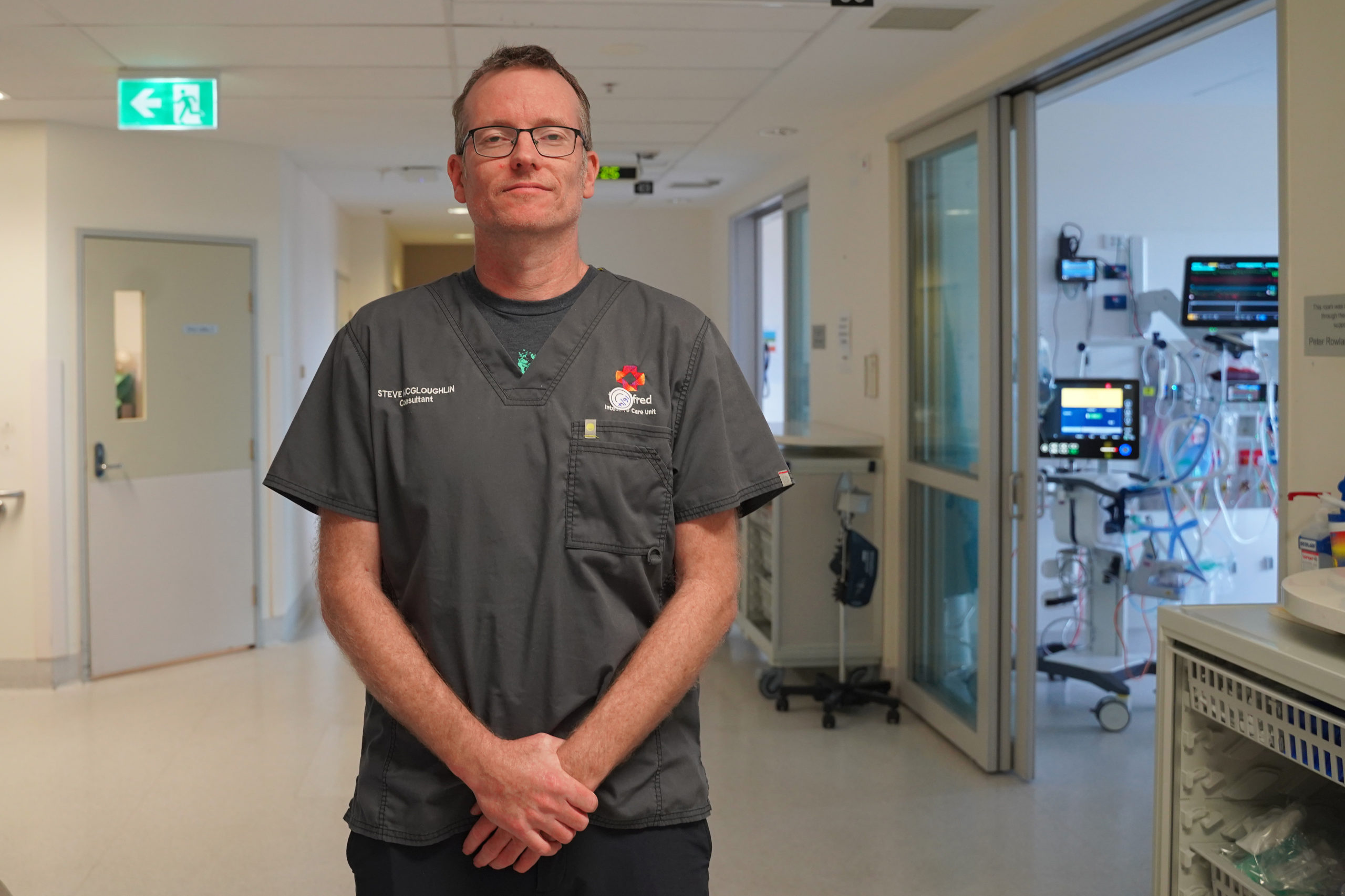
When the COVID-19 pandemic took hold in early 2020, the Intensive Care Unit (ICU) team at The Alfred hospital in Melbourne set itself the goal that no one would contract the disease while under its care.
Given the great uncertainty surrounding transmission of the virus this was a very bold ambition, made even more challenging by the state’s second wave of COVID-19 cases.
In total, the Alfred ICU cared for many of Victoria’s long-stay COVID-19 patients, amassing 12,000 hours of care.
Remarkably, and thankfully, the ICU achieved its goal of zero transmission.
This quiet success can be attributed to many factors—chief among them the focus on teamwork in the unit. Associate Professor Steve McGloughlin, an intensivist and infectious diseases physician, oversees the Alfred ICU team.
‘Part of the team’s success was that all our unit worked under clearly defined infection prevention protocols with a clearly designated area where COVID-19 patients were cared for. The staff did an extraordinary job adapting to the changes and challenges,’ he says.
‘Appropriate ventilation of the area was one of our first priorities as this is vital to ensuring staff safety when caring for COVID-19 patients.
‘While working in the same ward for an extended period can benefit consistency of care, it became paramount to rotate doctors and nurses out of the COVID ward after two weeks. We did this to ease the minds of staff about the worry of exposure, and to give them a break from the isolating nature of COVID practice, and the rigours of working in PPE.
‘Protective gowns and masks make for hot and sweaty work. The challenge of donning and doffing PPE during each shift is exhausting for any hospital worker but, given the risks working around COVID, you just do it.’
The unit also introduced PPE monitors to the team. He explains, ‘While every staff member was trained in the use of PPE, the monitor provided constant supervision and ongoing training in relation to PPE, allowing the staff to focus on their complex clinical role.
‘The explicit hope was for all our staff to be able to go home after work and feel confident they were not exposing their families to any risk.’
Steve and his wife, a paediatrician at the Royal Children’s Hospital, have three children. Their family-time was interrupted by the second lockdown when a bike-riding holiday in North-East Victoria ended abruptly so he could return to Melbourne to oversee Alfred Health’s renewed response to the pandemic.
Steve understands the importance of time away from the intensity of work—whether it’s jogging, reliving his glory days playing basketball as the ‘old man of the team’ or tinkering with his 1975 Kombi van before heading off on family camping adventures.
Steve’s leadership during the pandemic was also aided by his role with the National COVID-19 Clinical Evidence Taskforce as the Australian and New Zealand Intensive Care Society (ANZICS) nominee. He also belongs to fellow Taskforce member organisation, the Australasian Society for Infectious Diseases (ASID). Steve is what Taskforce staff have affectionately dubbed the ‘triple threat’—one of only two experts who volunteer for three panels, the Guidelines Leadership Group, the Infection Prevention and Control Panel and the Critical Care Panel, of which he’s Co-chair.
The 46-year-old plays down his contributions, but he does admit that he relishes the collegiate aspect of the Taskforce; the chance to pull together with his fellow clinical leaders.
‘You get to have an influence by being part of the Taskforce,’ he says. ‘But you also get to hear from experts in other fields. I like hearing other perspectives, it is always valuable.’
Steve attributes a significant factor in shaping his career in medicine was working part-time in aged care, while studying science at the Australian National University. ‘It was incredibly rewarding being able to help and care for vulnerable people,’ he says. ‘Medicine seemed the best vehicle for me to make a difference.’
Steve grew up in Canberra as the eldest of three siblings. Upon graduating from medicine at the University of Newcastle he worked overseas but had a strong yearning to practise in the tropics, to bring to life the stories he had heard from his parents, both of whom were teachers who had worked in Darwin and on Christmas Island.
Steve practised in Brisbane, Darwin and Cairns, which led to his interest in infectious diseases. He also learnt several important lessons during his time working with the Royal Flying Doctor Service that have influenced his medical leadership strategies: ‘I greatly admired how well they served and understood their community, but I’ll also never forget the skill of the pilots and their ability to land the aircraft in difficult terrain while adhering to the strict safety requirements.’
The parallels with medicine and being able to perform consistently while under pressure are obvious.
Steve was 36 when he moved to Melbourne in 2012 to join the ICU team at Alfred Health. Six years later he was promoted to ICU director overseeing a staff of 600. It’s an enormous responsibility in anyone’s terms, let alone in a pandemic.
Steve says his challenge now is to ensure that patients continue to receive the best possible care and that staff remain safe.
‘It’s the same with any job. If you don’t feel safe, you don’t do your job well.’
The pandemic has highlighted the vital role ICU’s play in caring for the nation’s sickest patients, something the Victorian Premier, Daniel Andrews, experienced first-hand at The Alfred in February following a serious fall.
The whole community can be extremely thankful for committed professionals like Steve McGloughlin, whose skill and leadership have not only ensured the best possible outcome for hospital staff and patients but have also contributed significantly to the entire nation’s COVID response.